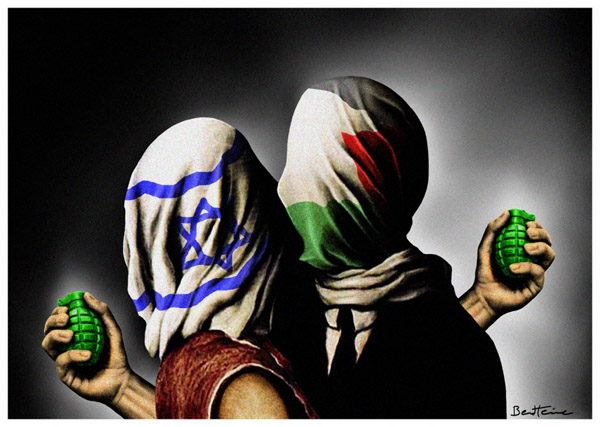
Prime Minister Netanyahu’s attempt to define Israel by law (the country’s constitution is actually a series of laws) as a ‘Jewish nation-State’ –a move criticised by President Rivlin– not only shows how radicalisation is taking hold but further hinders any solution to the conflict, be it two States, three or even just one, with demographics playing in the Palestinians’ favour. Furthermore, it shows how the conflict has become not only more identity-focused –it always has been– but also more radically religious, on both sides of the divide.
Islamic fundamentalism is on the rise among Palestinians. Hamas is an Islamist movement and, despite already being considered a terrorist group, it could become far worse if it were to be contaminated by, for instance, the Islamic State in the Levant (ISIS). But the fact that the religious issue has come to the fore on both sides –although the founders of the State of Israel tried to keep the religious factor at bay (as did Arafat among his own people) by promoting a secularism that appears to be fading away– makes it increasingly difficult to implement the two-State solution, which is the only sensible option despite its viability being on the wane. Religious tension is incompatible with the principle that inspired the peace process in Oslo 21 years ago of ‘land for peace’, with an obvious focus on security too. Jewish settlements have only deteriorated the situation further. But the strengthening of the conflict’s religious dimension will effectively hinder any agreement, especially if Netanyahu calls for the recognition by the Palestinians of Israel as a Jewish State as a new precondition for any peace agreement –which, in any case, he does not appear to be aiming for–. The proposal sits badly with democracy in a country in which 20% of the population is Arab-Israeli and growing, apart from other issues such as the Occupied Territories and the refugee question. The move reflects the growing influence of Israeli’s latest immigrant groups, mainly from the former Soviet Union, that lack any connection with the creation and construction of the State of Israel since 1948.
In this scenario of increasing radicalisation on both sides, it is regrettable that the so called ‘peace camp’ has practically vanished from sight in Israel and also among the Palestinians, whose National Authority is dominated by a gerontocracy. Their voices are not heard. And peace is unlikely if there is no political generation renewal on the two sides. Furthermore, if a peace agreement, or at least the resumption of efforts to such an end, is delayed, reaching a solution might be a possibility that has slipped out of the hands of those involved, thereby making the current status quo permanent –although this is something which Israel’s present leaders, and perhaps even its people also, are not entirely unhappy about due to the security provided by the wall and the country’s technological superiority. However, the recent knifing and hit-and-run car attacks denote a change in strategy by certain Palestinian terrorists. Israel should be aware that the current situation could ignite a third Intifada due to the frustration generated among the Palestinian population.
There is not all that much time available: probably only a few months, the time needed for the current US Secretary of State, John Kerry, to try again. However, he is handicapped by lack of support from the White House –now focused to a greater extent on Iran and the conflict in Iraq and Syria with the Islamic State and other entities– and of a Congress that from January on will be dominated by the Republicans. For its part, the EU –whose foreign policy is now under Federica Mongherini, who is determined to deal with the conflict– might do something, even if it never achieves real unanimity to put pressure on Israel, as some States, primarily Germany, are reluctant to do so. And a way to put pressure on Israel is by recognising Palestine as a subject of international (as the Swedish government has done) or by entertaining the possibility of recognising it (as the British, Irish, Spanish and French parliaments are doing today). It should be recalled that the former Eastern Europe States that are now in the EU have already recognised Palestine, as have Cyprus and Malta also (135 countries have already done so). But the European Parliament, in a debate last week, has revealed how divided it is and will not put the matter to the vote –of which the outcome is uncertain– until mid-December.
On 18 November the Spanish Congress of Deputies voted almost unanimously to urge the Spanish government to recognise Palestine, a step ahead with respect to its previous recognition as an observer State in UNESCO and the UN. The aim is, above all, to contribute to create a new a political space for negotiations and to preserve the two-State solution. But it is a possibility that will not remain open for too long, and in which the Quartet (the EU, the US, Russia and the UN) should become involved in addition to the Arab countries. However, the new Egyptian government’s radically anti-Islamist stance means that it has lost the capacity to mediate with Hamas and the Palestinian Authority. Ultimately, the aim is to gain a double recognition: of Palestine by the Europeans and others, and of Israel by the Arab world.
But if nothing happens, if the peace process fails to start up again and address the specific problems that remain, the EU –or, rather, several of its Member States– will have to bang its fist on the table, presenting recognition at the same time. Although this does not seem to worry Netanyahu too much, recognition should serve to encourage some sort of progress to be made. Unfortunately, if it does not work, nothing much will have changed the day after. And if something has been lacking in these long years of frustrated peace processes, it has been real pressure on both sides from the international community. Of course, the international community’s mind is presently on other matters, despite the fact that the Palestinian-Israeli conflict helps feed the flames of the other conflicts in the Middle East.


